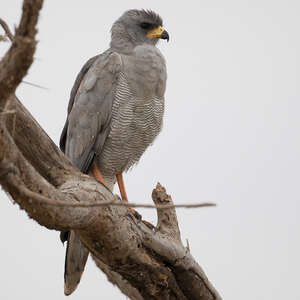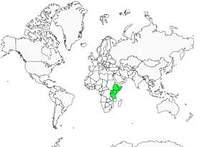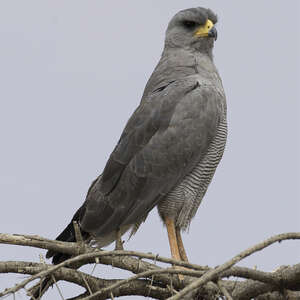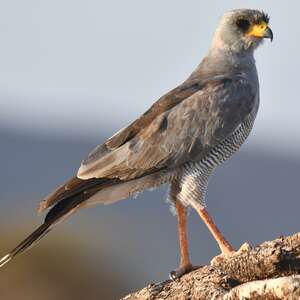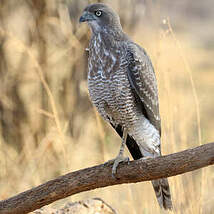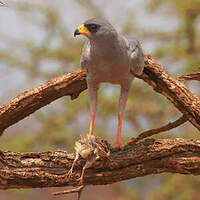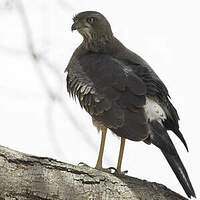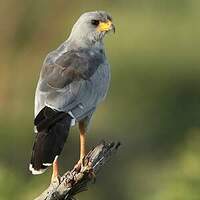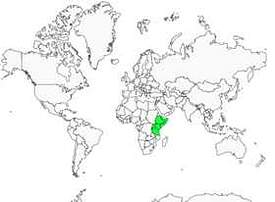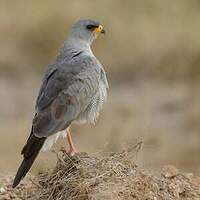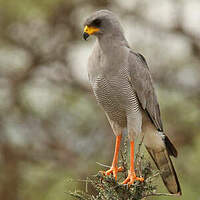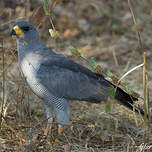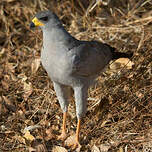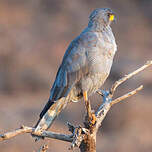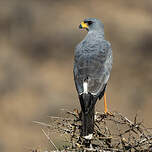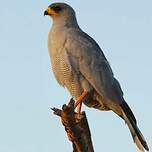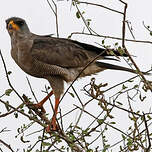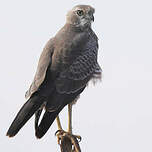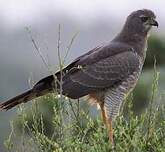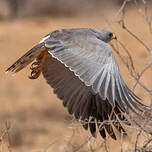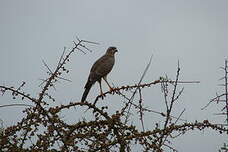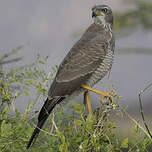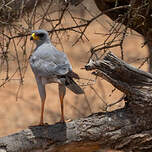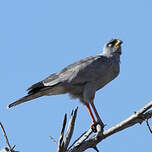Eastern Chanting Goshawk
Melierax poliopterus - Autour à ailes grises
Identification
The Eastern Chanting Goshawk is a medium-sized raptor, whose silhouette differs from that of Accipiter with its broad and wide wings and long, banded tail.
As with most raptors, the sexes are identical, the female slightly larger than the male. The adult is gray all over, finely barred with light from the chest to the belly. The tips of the wings and tail are darker. The rump is white. In this way, it resembles the gray buzzards, the marsh harrier and the Pallid Harrier, but its flight is very different.
The wax is yellow, the eyes are dark red and the long bare legs are orange-red.
The immature Eastern Chanting Goshawk has the upper side brown, the chest striped with brown, the belly white barred with brown. The rump is white like that of the adult, sometimes slightly stained with brown. The eyes are whitish-yellow. It is difficult to distinguish from the immature dark goshawk.
Subspecific information monotypic species
Foreign names
- Autour à ailes grises,
- Azor lagartijero somalí,
- açor-cantor-oriental,
- Weißbürzel-Singhabicht,
- keleti éneklőhéja,
- Bleke Zanghavik,
- Atore cantante orientale,
- östlig sånghök,
- Østsanghauk,
- jastrabec spevavý,
- jestřáb východoafrický,
- Somalisanghøg,
- somalianlauluhaukka,
- astor cantaire d'Àfrica oriental,
- jastrzębiak popielaty,
- Серый певчий ястреб,
- ヒガシコシジロウタオオタカ,
- 灰歌鹰,
- östlig sånghök,
- 歌鷹,
Voice song and call
The Eastern Chanting Goshawk primarily vocalizes during reproduction. The song is a long series of sharp notes, emitted either while in flight or from a perch.
The first notes are longer and sharper. The stanza has been transcribed as piiiii...piipiipipipipipipipi... or cliouuu-cliouuu-clou-clou-clou... which gives a fairly accurate account of the structure and the tone of the song. This salvo of notes can be repeated without ceasing.
The alarm call is a chirp which is similar to that of the Dark Goshawk.
Habitat
Eastern Chanting Goshawks frequent dry regions, scrub-covered savannahs dotted with thorny shrubs and wooded savannahs up to 2000m. It is more closely associated with arid zones than the Dark Chanting Goshawk, in the overlap zone between their ranges.
Behaviour character trait
The Eastern Chanting Goshawk lives alone or in pairs. It is usually seen perched prominently on the top of a bush, from where it can spot its prey and dive down to catch it. It is rarely observed on the ground outside of hunting.
It is a sedentary bird, although it can move within its range depending on the weather conditions and available resources.
Dietfeeding habits
Reproduction nesting
The Eastern Chanting Goshawk reproduces towards the end of the dry season. There are two egg-laying periods in Tanzania and Kenya, which have two rainy seasons.
The courtship is usually nocturnal, with the birds circling above the territory at the beginning of the night.
The nest is built by the pair in a tree, usually an acacia or an euphorbia, at about 5-8 meters in height. It is a platform of twigs of about 60 centimeters in diameter, shallow, which the birds line with various debris.
The clutch consists of one or two eggs, which are incubated for five weeks like other species of hawks. It is mainly the female who takes on the incubation.
The young stay in the nest for up to 8 weeks; usually only one survives, though no aggression has been noted between the chicks.
Geographic range
Threats - protection
IUCN conservation status
concern
in the Wild
threatened
evaluated
The Eastern Chanting Goshawk is widely spread in its range. In the Tsavo Park in Kenya, which provides an ideal habitat for this species, the density measured is 50 to 60 pairs per 100 km². As a result, the species is currently not considered threatened. Only destruction of trees through deforestation or overpopulation of elephants could in the future harm the species.
Sources of information
- IOC World Bird List (v15.1), Gill, F and D Donsker (Eds). 2025-12-07.
- Avibase, Lepage Denis
- HBW Alive,
- xeno-canto, Sharing bird sounds from around the world,
- Birds of East Africa: Kenya, Tanzania, Uganda, Rwanda, Burundi, Terry Stevenson, John Fanshawe
- Birds of Kenya and Northern Tanzania, Dale A Zimmerman, Donald A Turner, David J Pearson
Other sources of interest
 Specification sheet created on
30/07/2023 by Catherine et Bernard Lanneluc
Specification sheet created on
30/07/2023 by Catherine et Bernard LannelucTranslation by AI Oiseaux.net
© 1996-2025 Oiseaux.net
- Accipitriformes
- Aegotheliformes
- Anseriformes
- Apodiformes
- Apterygiformes
- Bucerotiformes
- Caprimulgiformes
- Cariamiformes
- Casuariiformes
- Charadriiformes
- Ciconiiformes
- Coliiformes
- Columbiformes
- Coraciiformes
- Cuculiformes
- Eurypygiformes
- Falconiformes
- Galliformes
- Gaviiformes
- Gruiformes
- Leptosomiformes
- Mesitornithiformes
- Musophagiformes
- Nyctibiiformes
- Opisthocomiformes
- Otidiformes
- Passeriformes
- Pelecaniformes
- Phaethontiformes
- Phoenicopteriformes
- Piciformes
- Podargiformes
- Podicipediformes
- Procellariiformes
- Psittaciformes
- Pterocliformes
- Rheiformes
- Sphenisciformes
- Steatornithiformes
- Strigiformes
- Struthioniformes
- Suliformes
- Tinamiformes
- Trogoniformes

